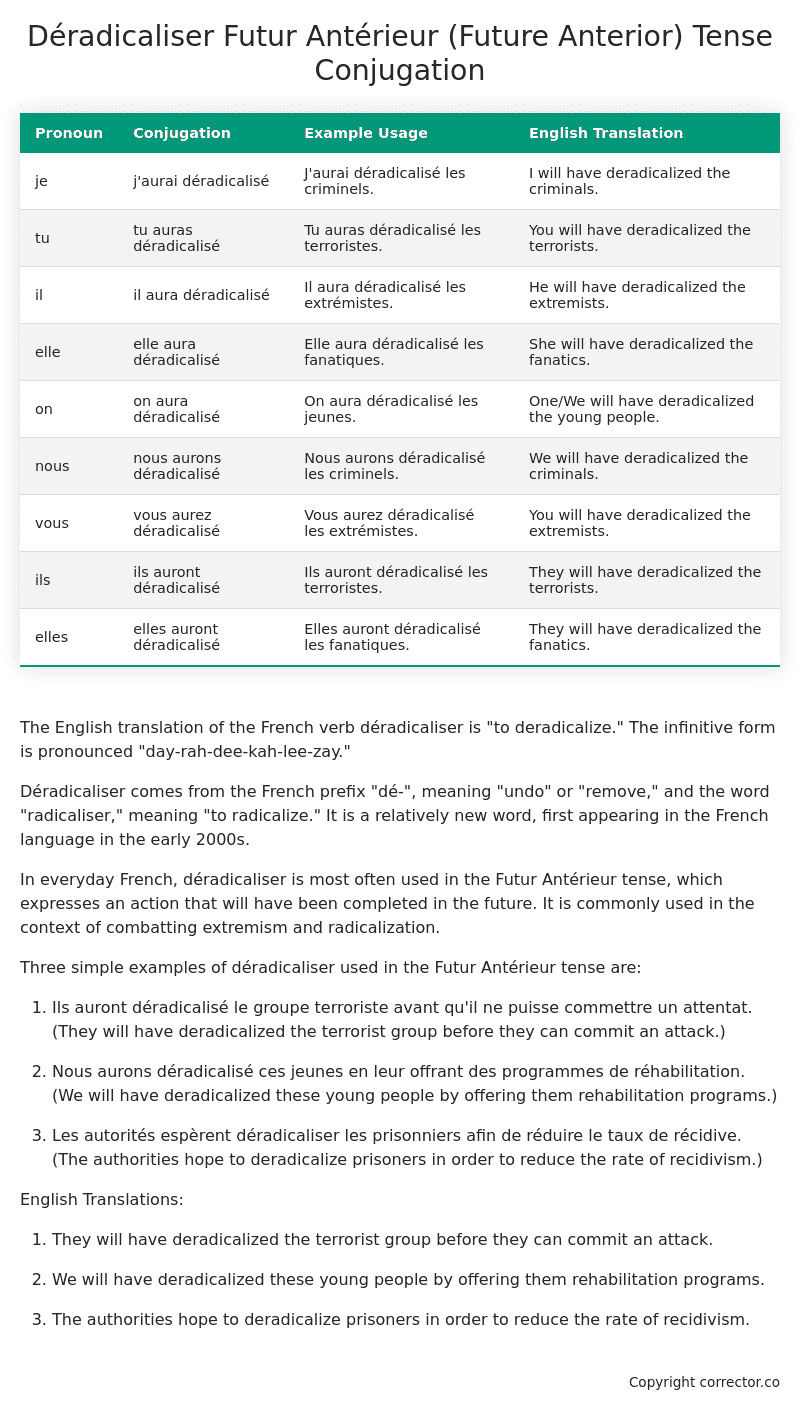Futur Antérieur (Future Anterior) Tense Conjugation of the French Verb déradicaliser
Introduction to the verb déradicaliser
The English translation of the French verb déradicaliser is “to deradicalize.” The infinitive form is pronounced “day-rah-dee-kah-lee-zay.”
Déradicaliser comes from the French prefix “dé-“, meaning “undo” or “remove,” and the word “radicaliser,” meaning “to radicalize.” It is a relatively new word, first appearing in the French language in the early 2000s.
In everyday French, déradicaliser is most often used in the Futur Antérieur tense, which expresses an action that will have been completed in the future. It is commonly used in the context of combatting extremism and radicalization.
Three simple examples of déradicaliser used in the Futur Antérieur tense are:
-
Ils auront déradicalisé le groupe terroriste avant qu’il ne puisse commettre un attentat. (They will have deradicalized the terrorist group before they can commit an attack.)
-
Nous aurons déradicalisé ces jeunes en leur offrant des programmes de réhabilitation. (We will have deradicalized these young people by offering them rehabilitation programs.)
-
Les autorités espèrent déradicaliser les prisonniers afin de réduire le taux de récidive. (The authorities hope to deradicalize prisoners in order to reduce the rate of recidivism.)
English Translations:
-
They will have deradicalized the terrorist group before they can commit an attack.
-
We will have deradicalized these young people by offering them rehabilitation programs.
-
The authorities hope to deradicalize prisoners in order to reduce the rate of recidivism.
Table of the Futur Antérieur (Future Anterior) Tense Conjugation of déradicaliser
| Pronoun | Conjugation | Example Usage | English Translation |
|---|---|---|---|
| je | j’aurai déradicalisé | J’aurai déradicalisé les criminels. | I will have deradicalized the criminals. |
| tu | tu auras déradicalisé | Tu auras déradicalisé les terroristes. | You will have deradicalized the terrorists. |
| il | il aura déradicalisé | Il aura déradicalisé les extrémistes. | He will have deradicalized the extremists. |
| elle | elle aura déradicalisé | Elle aura déradicalisé les fanatiques. | She will have deradicalized the fanatics. |
| on | on aura déradicalisé | On aura déradicalisé les jeunes. | One/We will have deradicalized the young people. |
| nous | nous aurons déradicalisé | Nous aurons déradicalisé les criminels. | We will have deradicalized the criminals. |
| vous | vous aurez déradicalisé | Vous aurez déradicalisé les extrémistes. | You will have deradicalized the extremists. |
| ils | ils auront déradicalisé | Ils auront déradicalisé les terroristes. | They will have deradicalized the terrorists. |
| elles | elles auront déradicalisé | Elles auront déradicalisé les fanatiques. | They will have deradicalized the fanatics. |
Other Conjugations for Déradicaliser.
Le Present (Present Tense) Conjugation of the French Verb déradicaliser
Imparfait (Imperfect) Tense Conjugation of the French Verb déradicaliser
Passé Simple (Simple Past) Tense Conjugation of the French Verb déradicaliser
Passé Composé (Present Perfect) Tense Conjugation of the French Verb déradicaliser
Futur Simple (Simple Future) Tense Conjugation of the French Verb déradicaliser
Futur Proche (Near Future) Tense Conjugation of the French Verb déradicaliser
Plus-que-parfait (Pluperfect) Tense Conjugation of the French Verb déradicaliser
Passé Antérieur (Past Anterior) Tense Conjugation of the French Verb déradicaliser
Futur Antérieur (Future Anterior) Tense Conjugation of the French Verb déradicaliser (this article)
Subjonctif Présent (Subjunctive Present) Tense Conjugation of the French Verb déradicaliser
Subjonctif Passé (Subjunctive Past) Tense Conjugation of the French Verb déradicaliser
Subjonctif Imparfait (Subjunctive Imperfect) Tense Conjugation of the French Verb déradicaliser
Conditionnel Présent (Conditional Present) Tense Conjugation of the French Verb déradicaliser
Conditionnel Passé (Conditional Past) Tense Conjugation of the French Verb déradicaliser
L’impératif Présent (Imperative Present) Tense Conjugation of the French Verb déradicaliser
L’infinitif Présent (Infinitive Present) Tense Conjugation of the French Verb déradicaliser
Struggling with French verbs or the language in general? Why not use our free French Grammar Checker – no registration required!
Get a FREE Download Study Sheet of this Conjugation 🔥
Simply right click the image below, click “save image” and get your free reference for the déradicaliser Futur Antérieur tense conjugation!

Déradicaliser – About the French Futur Antérieur (Future Anterior) Tense
Construction
Common Everyday Usage Patterns
Interactions with Other Tenses
For example
Summary
I hope you enjoyed this article on the verb déradicaliser. Still in a learning mood? Check out another TOTALLY random French verb conjugation!


